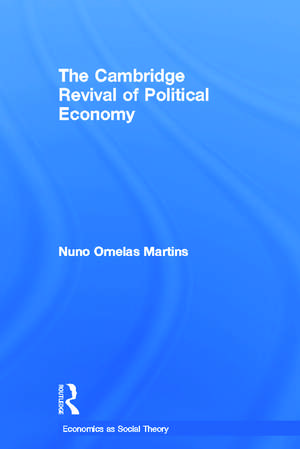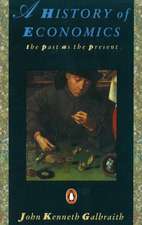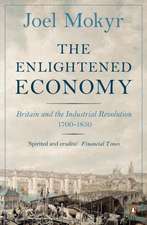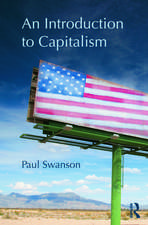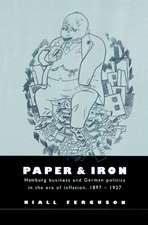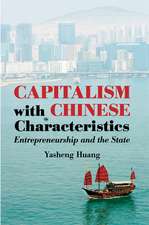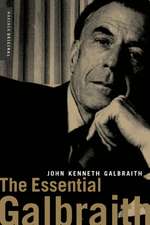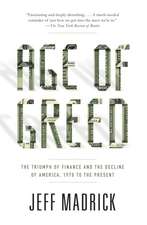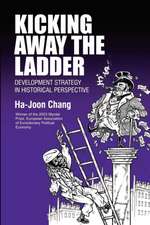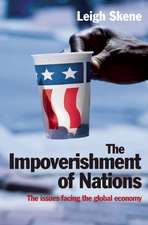The Cambridge Revival of Political Economy: Economics as Social Theory
Autor Nuno Ornelas Martinsen Limba Engleză Hardback – 19 oct 2013
The author shows that classical political economy is distinct from vulgar political economy in terms of its economic, social, and ethical theory, with each difference resting on an issue of ontology. Structured in three parts, the book examines the central contested aspects of these theories, namely the nature of value, the relationship between human beings and social structure, and the nature of human wellbeing.
The Cambridge Revival of Political Economy will be relevant to students and researchers within the fields of political economy, history of economic thought, politics and philosophy.
| Toate formatele și edițiile | Preț | Express |
|---|---|---|
| Paperback (1) | 470.87 lei 6-8 săpt. | |
| Taylor & Francis – 24 oct 2013 | 470.87 lei 6-8 săpt. | |
| Hardback (1) | 770.74 lei 6-8 săpt. | |
| Taylor & Francis – 19 oct 2013 | 770.74 lei 6-8 săpt. |
Din seria Economics as Social Theory
- 15%
 Preț: 543.22 lei
Preț: 543.22 lei - 8%
 Preț: 441.23 lei
Preț: 441.23 lei - 15%
 Preț: 492.36 lei
Preț: 492.36 lei -
 Preț: 356.09 lei
Preț: 356.09 lei -
 Preț: 279.86 lei
Preț: 279.86 lei -
 Preț: 428.09 lei
Preț: 428.09 lei - 18%
 Preț: 1436.89 lei
Preț: 1436.89 lei - 15%
 Preț: 420.28 lei
Preț: 420.28 lei - 22%
 Preț: 354.65 lei
Preț: 354.65 lei - 15%
 Preț: 426.70 lei
Preț: 426.70 lei - 15%
 Preț: 470.87 lei
Preț: 470.87 lei -
 Preț: 377.66 lei
Preț: 377.66 lei -
 Preț: 478.03 lei
Preț: 478.03 lei -
 Preț: 417.20 lei
Preț: 417.20 lei - 15%
 Preț: 576.47 lei
Preț: 576.47 lei - 43%
 Preț: 207.05 lei
Preț: 207.05 lei - 26%
 Preț: 766.31 lei
Preț: 766.31 lei -
 Preț: 532.58 lei
Preț: 532.58 lei - 15%
 Preț: 430.45 lei
Preț: 430.45 lei -
 Preț: 295.81 lei
Preț: 295.81 lei - 15%
 Preț: 456.21 lei
Preț: 456.21 lei - 15%
 Preț: 422.26 lei
Preț: 422.26 lei - 15%
 Preț: 458.59 lei
Preț: 458.59 lei - 15%
 Preț: 470.85 lei
Preț: 470.85 lei - 26%
 Preț: 1217.42 lei
Preț: 1217.42 lei - 18%
 Preț: 1672.42 lei
Preț: 1672.42 lei - 30%
 Preț: 1017.37 lei
Preț: 1017.37 lei - 15%
 Preț: 515.60 lei
Preț: 515.60 lei - 27%
 Preț: 251.80 lei
Preț: 251.80 lei - 18%
 Preț: 1000.27 lei
Preț: 1000.27 lei - 18%
 Preț: 1282.67 lei
Preț: 1282.67 lei - 15%
 Preț: 463.49 lei
Preț: 463.49 lei - 26%
 Preț: 850.99 lei
Preț: 850.99 lei - 15%
 Preț: 478.96 lei
Preț: 478.96 lei
Preț: 770.74 lei
Preț vechi: 1106.61 lei
-30% Nou
Puncte Express: 1156
Preț estimativ în valută:
147.48€ • 154.39$ • 122.03£
147.48€ • 154.39$ • 122.03£
Carte tipărită la comandă
Livrare economică 05-19 aprilie
Preluare comenzi: 021 569.72.76
Specificații
ISBN-13: 9780415676830
ISBN-10: 0415676835
Pagini: 488
Dimensiuni: 156 x 234 x 33 mm
Greutate: 0.82 kg
Ediția:1
Editura: Taylor & Francis
Colecția Routledge
Seria Economics as Social Theory
Locul publicării:Oxford, United Kingdom
ISBN-10: 0415676835
Pagini: 488
Dimensiuni: 156 x 234 x 33 mm
Greutate: 0.82 kg
Ediția:1
Editura: Taylor & Francis
Colecția Routledge
Seria Economics as Social Theory
Locul publicării:Oxford, United Kingdom
Public țintă
PostgraduateCuprins
Foreword by G. C. Harcourt Preface Part I: Economic Theory 1. The Theory of Value and Distribution 2. The Ontology of Value and Distribution 3. The Accumulation of Capital 4. The Principle of Effective Demand 5. Mathematics and Reality Part II: Social Theory 6. Rational Fools 7. Social Ontology 8. Heterodox Economics as Surplus Theory 9. Platonism and Cambridge 10. Evolutionary Social Theory 11. History and Evolution Part III: Ethical Theory 12. Uncertainty and Ethical Analysis 13. Justice and the Capability Approach 14. Ontology and Moral Realism 15. Capabilities as Primary (Causal) Powers
Notă biografică
Nuno Martins is Lecturer in Economics at the University of the Azores, Portugal. He is also a member of the Centro de Estudos em Gestão e Economia at UCP-Porto, and of the Cambridge Social Ontology Group.
Recenzii
'This book offers an illuminating analysis of the ideas and figures in the history of political economy at Cambridge from Marshall up to the present day, in terms of a common approach' — Sheila Dow, Emeritus Professor of Economics, University of Stirling, UK
'Nuno Martins is one of the most outstanding economists of his generation. A key theme of his book is that while classical political economy is essentially a surplus theory, neoclassical economics is a scarcity theory. Martins also shows that the central problems for advanced economies and societies since the onset of neo-liberalism have not so much been about the allocation of scarce resources as offsetting the increasingly unequal distribution of surpluses. His book brilliantly rebuts the dismissal of the Cambridge School by economists such as Samuelson and Solow, and is replete with implications not only for economics but also for politics and ethics' — Stuart Holland, Faculty of Economics, University of Coimbra, Portugal
'This book makes an important, new contribution to understanding the Cambridge economic tradition as the inheritor and further developer of the surplus approach of classical political economy. Its special achievement is to see this in broader terms than others have by framing its discussion simultaneously in terms of economic theory, the social theory, and the ethical theory. The book is philosophically and historically rich, and excellent in its grasp of a wide range of subtle issues. It is very much recommended for those concerned with the state of economics and the long run economic and social issues facing modern economies' — John B. Davis, Marquette University, USA and University of Amsterdam, Netherlands
'Nuno Martins is one of the most outstanding economists of his generation. A key theme of his book is that while classical political economy is essentially a surplus theory, neoclassical economics is a scarcity theory. Martins also shows that the central problems for advanced economies and societies since the onset of neo-liberalism have not so much been about the allocation of scarce resources as offsetting the increasingly unequal distribution of surpluses. His book brilliantly rebuts the dismissal of the Cambridge School by economists such as Samuelson and Solow, and is replete with implications not only for economics but also for politics and ethics' — Stuart Holland, Faculty of Economics, University of Coimbra, Portugal
'This book makes an important, new contribution to understanding the Cambridge economic tradition as the inheritor and further developer of the surplus approach of classical political economy. Its special achievement is to see this in broader terms than others have by framing its discussion simultaneously in terms of economic theory, the social theory, and the ethical theory. The book is philosophically and historically rich, and excellent in its grasp of a wide range of subtle issues. It is very much recommended for those concerned with the state of economics and the long run economic and social issues facing modern economies' — John B. Davis, Marquette University, USA and University of Amsterdam, Netherlands
Descriere
The marginalist revolution of the late nineteenth century consolidated what Karl Marx and Piero Sraffa called ‘vulgar economy’, bringing with it an emphasis on a scarcity theory that replaced the classical surplus theory. However, the classical political economy of Adam Smith and David Ricardo has been revived within the Cambridge economic tradition. This book looks at how different branches of the Cambridge economic tradition have focused on various aspects of this revival over time.
